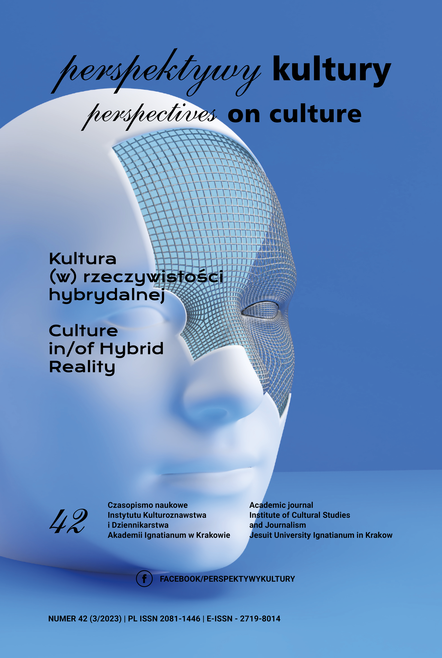Parish and Family in the Cultural Heritage of the Polish Emigrants to Texas in the Second Wave (1867)
Abstract
The article focuses primarily on the institutions of the parish and family in relation to the cultural heritage of Polish Texans of the second wave since 1867. Reaching back to the beginnings of Polish emigration to the United States, which is associated with the settlement of Panna Maria in Texas by emigrants from Opole Silesia, the article presents the second wave of emigration from Galicia and Greater Poland. The analysis was based on the archival materials of the Polish Genealogical Society of Texas (PGST), which cover the periods from 1984 to 2021. The research material was collected from 124 PGST volumes (4,358 pages). The document proves that both the parish and the family were the basic units in the lives of Polish emigrants, around whom everyday family, social and religious life revolved.
References
Baker, T.L. (1996), The First Polish American Silesian Settlement in Texas. College Station: Texas A & M University Press,
Brożek, A. (1985). Polish Americans 1854-1939. Warsaw: Interpress Pu-blishers.
Czas “Chłop polski w Ameryce” 15.01.1874, pp. 1–2.
Dworaczyk, J. (1937). The First Polish Colonies of America in Texas. San Antonio: R & E Research.
Bukowczyk, J.J. (1986). And my children did not know me: A History of the Polish-Americans. Bloomington: Indiana University Press.
Bukowczyk, J.J. (1985). Mary the Messiah: Polish Immigrant Heresy and the Malleable Ideology of the Roman Catholic Church, 1880–1930. Journal of American Ethnic History, 4(2), 5–32.
Haiman, M. (1936). The Poles in the Early History of Texas, Annals of the Polish Roman Catholic Union Archive and Museum. Chicago: Polish Roman Catholic Union of America.
Felczak, H. (1991). Unpublish materials on Polish emigration to Texas in the second half of the 19th century.
Galveston Daily News (1874). (Galveston, Tex.) No. 393, ed.1 Sunday, January 11, 2.
Gazeta Polska w Chicago, 25 stycznia 1877, No. 15, 1.
Koliński, D. (1995). Polish Rural Settlement in America. Polish American Studies, Vol. 52, No. 2.
Monzell, I.T. (1969). The Catholic Church and the Americanization of the Polish Immigrant. Polish American Studies, Vol. 26, No. 1.
Morawska, E. (1989). Labor migration of Poles in the Atlantic world economy, 1880–1914. Comparative Studies in Society and History, Vol. 31, No. 2, 237–272.
Nesterowicz, S. (1910). Notatki z podróży po Północnej i PołudniowejAmeryce.
Olson, S.J. (1987). Polish Ethnoreligion of East Texas: The Case of St. Jo-seph’s Parish, 1866–1900. East Texas Historical Journal, Vol. 25, No. 1, art. 8.
Polish Genealogical Society of Texas, (1984–2021).
Praszałowicz, D. (2003). Overseas Migration from Partitioned Poland: Poznania and Eastern Galicia as Case Studies. Polish American Studies.
Przygoda, J. (1971). Texas Pioneers from Poland: A Study in the Ethnic History. Bandera–Texas: Polish American Center.
Radzilowski, A. (2009). Social History of Polish-American Catholicism. U.S. Catholic Historian, Vol. 27, No. 3, Polish American Catholics, 27.
Thomas, I.W. & Znaniecki, F. (1927). The Polish Peasant in Europe and America: Monograph of an Immigrant Group (vol. 1–2). Boston: Dover.
Copyright (c) 2023 Perspectives on Culture

This work is licensed under a Creative Commons Attribution-NoDerivatives 4.0 International License.
Autor, zgłaszając swój artykuł, wyraża zgodę na korzystanie przez Wydawnictwo Uniwersystet Ignatianum z utworu na następujących polach eksploatacji:
- utrwalania utworu w formie papierowej, a także na nośniku cyfrowym lub magnetycznym;
- zwielokrotnienia utworu dowolną techniką, bez ograniczenia ilości wydań i liczby egzemplarzy;
- rozpowszechniania utworu i jego zwielokrotnionych egzemplarzy na jakimkolwiek nośniku, w tym wprowadzenia do obrotu, sprzedaży, użyczenia, najmu;
- wprowadzenia utworu do pamięci komputera;
- rozpowszechniania utworu w sieciach informatycznych, w tym w sieci Internet;
- publicznego wykonania, wystawienia, wyświetlenia, odtworzenia oraz nadawania i reemitowania, a także publicznego udostępniania utworu w taki sposób, aby każdy mógł mieć do niego dostęp w miejscu i czasie przez siebie wybranym.
Wydawca zobowiązuje się szanować osobiste prawa autorskie do utworu.





